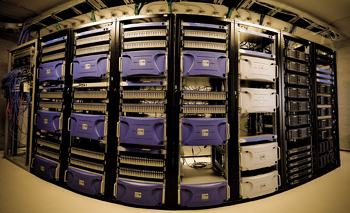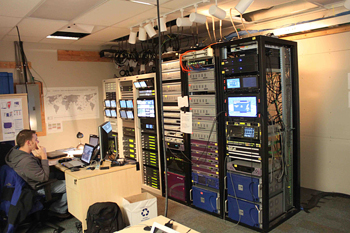Servers Maximize Vancouver Games Broadcast
The professional video industry's #1 source for news, trends and product and tech information. Sign up below.
You are now subscribed
Your newsletter sign-up was successful
EVS Delivers in VancouverServers Maximize Vancouver Games Broadcast
Slo-Mos and XMOs in Vancouver
File Transfers Key in ONC Workflow
NBC: Servers for Broadcast and New Media Production
ARD, ZDF Tackle Tapeless, HD in Vancouver
NAB Workshops on Vancouver Games, FIFA World Cup
There were many stellar moments from Vancouver — from Kim Yu-Na landing her final jump to Canada’s sudden-death overtime victory in ice hockey. Valuable content like this is best served hot — that’s how a host broadcaster at an event such as the Winter Games can maximize its value for rights-holding broadcasters. Seconds matter.
OBS deployed more than 20 EVS XT[2] servers at the International Broadcast Center (IBC) in downtown Vancouver and at the venues to help its clients — the world’s rights-holding broadcasters — send great content home faster.
“If you really wish to use to the best possible extent the live content that we have, this can only be done if you effectively record and access it in a very fast and efficient way,” said Sotiris Salamouris, head of engineering for host broadcaster OBS. “So server systems are quite important.”
At the tip of the spear, dozens of XT and other EVS servers were ‘in the trucks’ at the venues, provided the slo-mo and instant replay content needed in a modern broadcast. At the IBC all ingest and playout was from XT[2] servers, although ENG camera crew content came in from Panasonic P2 solid-state camcorders.
OBS also took advantage of workflow and networking attributes of its EVS server infrastructure to deliver more services than ever before. One popular option that had debuted in Beijing returned to Vancouver: A Browse Service that allowed rights-holders to look at browse copies of content using an EVS IP Director station, before picking only needed content for HD Delivery to an EVS server in their facility. IP Director fulfilled many other tracking and content access functions for OBS, as well.

The Vancouver International Broadcast Center
Expanded ONC
Also making a repeat performance after a small 25-man trial run in Beijing was the ONC, a 24-hour news channel operation that deployed a crew of 75 to produce multiple highlight reels/news packages with commentary each day.
Salamouris said that while the ONC was ideal for smaller broadcasters with limited recording and staffing resources on site, it was also appealing to larger organizations as an add-on: U.S. rights-holder NBCU ingested the whole ONC with commentary for use on one of its HD cable channels.
Italy’s Sky Italia is another example of a larger ONC customer. “They have capacity, but the challenge is not bandwidth or capacity, it is content,” said Salamouris. “They are extremely happy to have quality HD content prepared for use.”
Salamouris said Vancouver optimized ONC workflows that had been trialed in Beijing, and that again the server infrastructure was at the heart of the operation. “Without having a very efficient centralized server system it is not possible to create the kind of content they are creating with the ONC,” said Salamouris. The biggest challenge, however, was setting up such a sophisticated and complex infrastructure within one week, he said.
Attracting a Winter Games Audience

EVS XT[2] servers formed the backbone of OBS’ recording infrastructure. Another service that helped broadcasters fill their capacity with quality stories to attract eyeballs was called the Multichannel Platform, a four-channel satellite-based distribution service of raw feeds of the day’s events coupled with the edited ONC channel.
“We pick up the best content, some live, and some playback of recorded content in the evening when events are not happening live,” said Salamouris.
Relying on the rapid turnaround only possible in a server-based environment, the Multichannel Platform helped smaller broadcasters and organizations get a lot of raw content home in a hurry. One customer was New Zealand rights-holder SKY Television, a combination pay/FTA broadcaster who established an audience for the Winter Games in a country that has in the past has generally only mustered a daily highlights package of these events. In Vancouver there was an order of magnitude more coverage, with the addition of four 24/7 SKY Sport Olympic Games channels (SKY Sport 4, 5, 6, and 7) .
And this content was watched. The Vancouver Games drove significant growth in viewership for SKY during the Games period. And they did it with just 20 or so staffers in Vancouver, supporting a larger crew back home taking in the Multichannel Platform feeds.
Salamouris said that the initial hope for the Multichannel Platform was that it would have about six users, but more than 20 broadcasters made use of the service, including many larger rights-holders using it as a supplement.
TheVenue Server
The professional video industry's #1 source for news, trends and product and tech information. Sign up below.

EVS servers in the Multichannel Platform room ingested feeds and played content out over four satellite channels. OBS’s new “venue unilateral server” service debuted in Vancouver, and gave broadcasters with a presence at the venue unprecedented access to content recorded in the servers inside the host trucks, at the same time as the OBS team.
Salamouris said this was a way to rapidly provide broadcasters more content and make their presence at the venue less costly. NBC was the big customer in Vancouver.
The engineering design relied heavily on the fundamental networking and replication attributes of servers. OBS established an additional EVS server farm linked to the OB van server farm through Gigabit Ethernet connectivity in a way that guaranteed the security of the core broadcast.
With this connectivity OBS pushed high value clips — often slo-mos and replays — from the truck to the server in the compound, and this server is directly accessible to subscribing broadcasters.
“The rights-holders can now get the same material OBS is getting and can do what they want with it, right away,” said Salamouris. “Now they have access to all this material that they otherwise would not have, unless they were taking baseband splits of all of our cameras — it provides more flexibility in their coverage and immediacy.”
